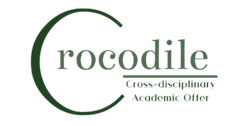A set of class scenarios prepared in accordance with the universal design assumptions.
The courses will show how to implement an educational offer which will be universal, addressed to all degree programmes, allowing students to create their own learning paths as well as teaching them the responsibility for their own choices. The stimulation of such an attitude is one of the basic tasks of university education.
Nowadays, the belief in the possibility and need of implementing universal, transdisciplinary, transcultural, and transnational education is becoming clear for all universities. The preparation of diverse educational materials facilitating the work on such an innovative educational offer at level 7 of the Polish Qualifications Framework (PRK) will be helpful for many academic teachers. Due to the civilisational changes and fast pace of life, the idea of university education focused on one discipline becomes obsolete and insufficient, as well as uninteresting from the point of view of a student. It is worth emphasizing that such an educational offer will take into consideration the cognitive needs and capacities of various audiences. Educational scenarios and materials should not only comply with the universal design assumptions, but also take advantage of the latest achievements and proven methodological mechanisms in distance learning.
We assume that the theme of the project courses could revolve around currently important or universal issues, which make up the following paths of university education:
- rhetorical path: academic writing, critical thinking, art of public speaking, eristic;
- legal and civil path: human and civil rights, gender equality and other forms of non-discrimination;
- environmental path: geoengineering, new “worlds,” quality of life in the space created by human beings;
- digital path: digital competencies, new
technologies, elimination of digital exclusion.
The entire offer will be prepared with its realisation in a synchronous remote mode in mind, so that students of universities involved in the project can participate in the classes. Thanks to that, we will fulfil the idea of remote mobility, which is not only ecologically correct but also enables us to remove barriers stemming from the determinants of classic mobility.
Sofia University
- Economic Policy
- Environmental Transformation: Nature in the City and City in the Nature
- Media Literacy in the Digital Age
Universidad de Alicante
- Spain Society Culture and Economy
- UNESCO World Heritage
University of Silesia in Katowice
- Gender Equality in Society
- Language – gender – culture
- Selected issues of the contemporary world
Vytautas Magnus University
- Computer-assisted translation
- Interdisciplinary Approaches to Nature in Urban Setting
